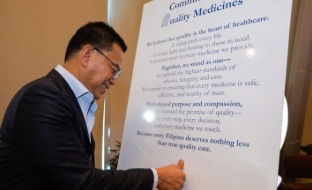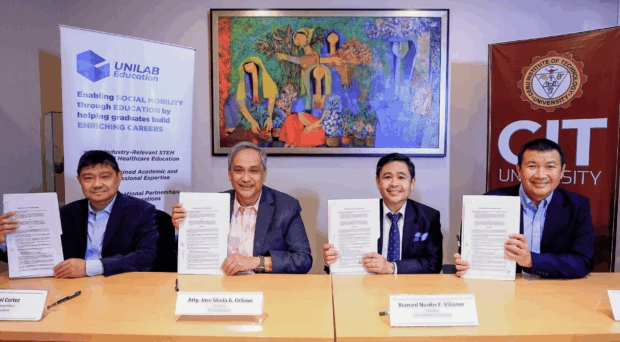Study points to local health spending gaps
Study points to local health spending gaps
The Department of Budget and Management (DBM) has lauded a new study citing gaps in how local government units (LGUs) spend their health budgets, calling the findings a valuable tool for its campaign to maximize local resources.
The study, commissioned by the Unilab Center for Health Policy (UCHP), found that while LGU health allocations rose by up to 5 percent, many municipalities still heavily depend on the national tax allocation, which makes up 74 percent to 95 percent of their funds.
Conducted by the Ateneo School of Government and the Ateneo Policy Center, the research reviewed LGU budget practices from 2022 to mid-2025. It found that a large portion of health budgets goes to personnel salaries, leaving fewer resources for health programs and services.
The study also cited overlapping requirements, delayed fund releases and misaligned directives as barriers to efficient spending. It recommended stronger technical support, clearer policy guidance, and closer coordination between national and local priorities.
John Basa, UCHP program director, said the results underscore the urgent need for government agencies such as the DBM, the Department of Finance’s Bureau of Local Government Finance, the Department of the Interior and Local Government and the Department of Health (DOH) to provide stronger support and clearer guidance to local governments.
He also stressed the crucial role of Congress in reviewing legislation to promote sustainable health spending at the LGU level.
“With improved systems and alignment, LGUs can transform their health budgets from routine expenditures into powerful investments that directly improve the well-being of their constituents,” Basa said.
According to Dr. Maria Eufemia Yap, a senior research fellow at the Ateneo Policy Center, the study was designed to track LGU spending and explain why budget execution faces bottlenecks. She said the research supports the DBM’s public financial management roadmap and pushes for greater fiscal accountability.
Yap said the goal is to identify the root causes of inefficiencies and develop solutions that will help LGUs maximize resources for health. “Our ultimate aim is to convert field findings into scalable instruments for national reform,” she said.
In a speech delivered by Budget Undersecretary Margaux Salcedo, Budget Secretary Amenah Pangandaman said the study complements the DBM’s efforts to help LGUs manage their health budgets more effectively.
“LGUs must ensure that their Local Investment Plan for Health and Annual Operation Plans are fully aligned with the National Health Expenditure Program, as this will enable LGUs to access counterpart funds and maximize resources for their localities,” Pangandaman said.
She said the national government is prioritizing capacity-building programs to help LGUs address gaps in planning and implementation. The DBM also urged LGUs to strengthen partnerships with the DOH to maximize national programs like the Human Resources for Health Deployment and Medical Assistance initiatives.
During a panel discussion, Naga City Mayor Leni Robredo shared her city’s experience, highlighting the fiscal pressures LGUs face. She noted that Naga, with a population of 215,000, remains heavily reliant on the national tax allocation, with more than half of its 2025 health budget going to personnel services.
Robredo also flagged inefficiencies in health financing. “The meager amount that we receive from PhilHealth, I realize that they are being used like a piggy bank,” she said.
Meanwhile, the People’s Budget Coalition urged the government to fund independent monitoring studies to strengthen transparency and accountability in health spending.
Kenneth Isaiah Abante, the coalition’s lead convenor, said their budget analysis showed persistent gaps in service delivery. “Health budgets under the Universal Health Care goals remain underfunded. The recommended spending is 5 percent of GDP, but the national budget is now just around 0.9 percent to 1 percent,” he said.
Abante said improving local evaluation through partnerships with universities would go a long way in addressing weaknesses in health budget planning and execution.
Other Related News
 alt="" draggable="false">
alt="" draggable="false">
Unilab joins forces with healthcare community to ensure quality medicines for Filipinos
Unilab teams up with healthcare leaders to ensure Filipinos have access to safe, high-quality medicines, advocating vigilance and global pharmaceutical standards.
 alt="" draggable="false">
alt="" draggable="false">
First aid on site: Unilab backs crowd safety at Peñafrancia Festival
Unilab, through Alagang Unilab, set up first-aid stations and medical teams with the Naga Basilica for the Peñafrancia Festival, extending on-site care to thousands of devotees.
 alt="" draggable="false">
alt="" draggable="false">
 alt="" draggable="false">
alt="" draggable="false">
Gary V, BINI, Darren & More at Alagang Suki Fest 2025
The biggest names in the music industry, Gary Valenciano, BINI, Darren, Maki, and Mayonnaise, will come together at the Araneta Coliseum to celebrate healthcare
 alt="" draggable="false">
alt="" draggable="false">
EJAP, Unilab bring back Health and Wellness Day for media members
Over 80 economic and business journalists joined the EJAP-Unilab Health and Wellness Day on June 21, 2025, at the Bayanihan Center—EJAP’s first wellness event since 2021.
 alt="" draggable="false">
alt="" draggable="false">
Unilab plans to transform Laguna campus into ecozone
Local pharmaceutical giant United Laboratories Inc. (Unilab) is looking to convert its Laguna campus into a designated pharmaceutical economic zone, a move seen boosting the local drug manufacturing industry.